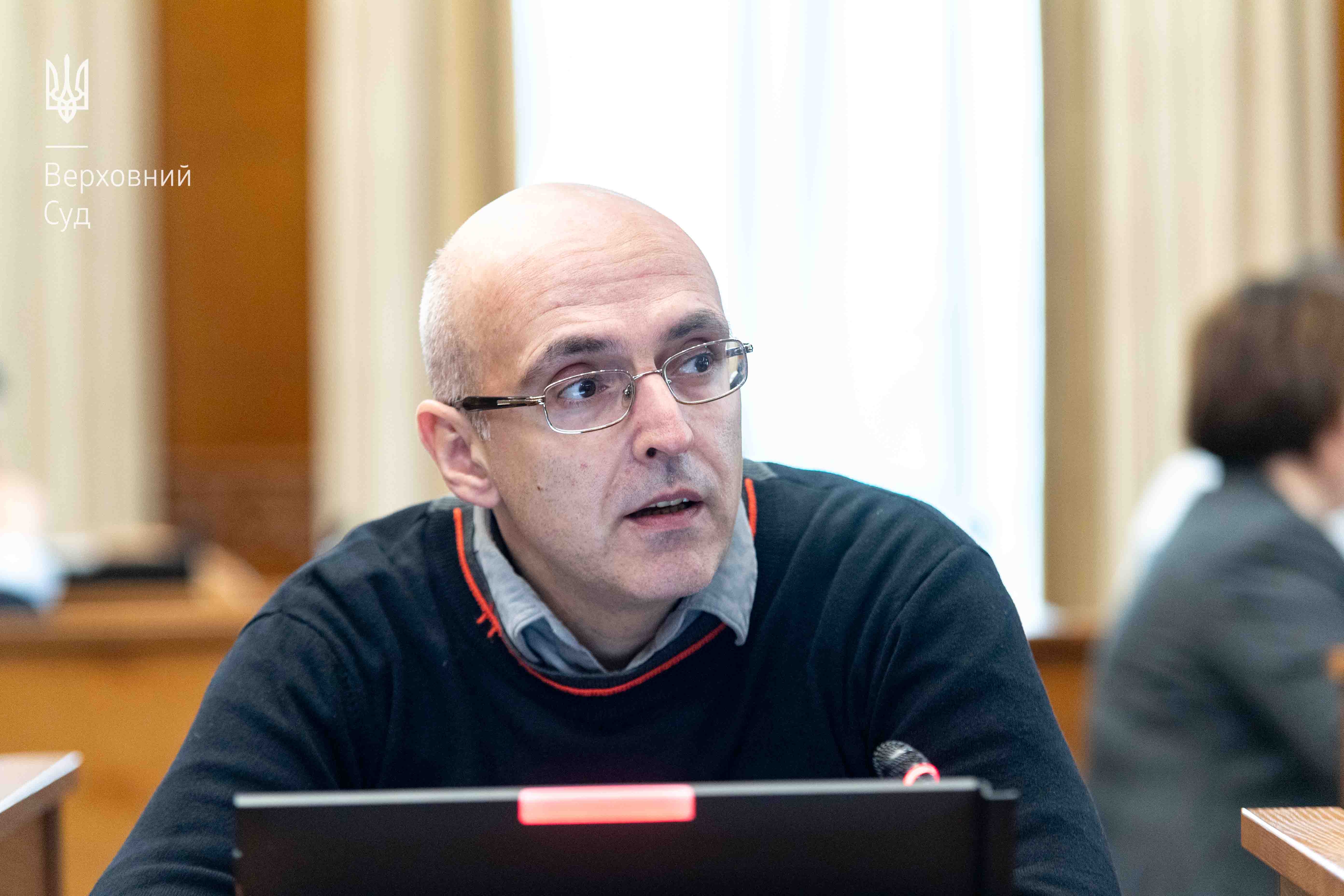Contact center of the Ukrainian Judiciary 044 207-35-46

During the training session entitled 'Ways to improve the compensation process for damaged/destroyed housing: practical aspects', Supreme Court Judge at the Administrative Cassation Court Serhii Ukhanenko and Supreme Court Judge at the Civil Cassation Court Vasyl Krat highlighted the practical aspects of the activities of the commissions for consideration of issues related to compensation for damaged or destroyed housing and certain issues of protection of property rights to real estate.
Supreme Court Judge at the Civil Cassation Court Serhii Ukhanenko focused on the practical aspects of the work of commissions for consideration of issues related to compensation for damaged or destroyed housing.
First of all, he reminded the audience of Article 2 of the Law of Ukraine ‘On Compensation for Damage and Destruction of Certain Categories of Real Estate as a Result of Hostilities, Terrorist Acts, Sabotage Caused by the Armed Aggression of the Russian Federation against Ukraine and the State Register of Property Damaged and Destroyed as a Result of Hostilities, Terrorist Acts, Sabotage Caused by the Armed Aggression of the Russian Federation against Ukraine’, which defines the list of recipients of compensation for damaged/destroyed real estate.
The speaker paid attention to the rights of foreigners, referring to Article 1 of the European Convention on Human Rights, which guarantees the rights and freedoms of everyone under the jurisdiction of the member states of the Council of Europe that have signed the Convention. In particular, Serhii Ukhanenko raised the issue of possible problems arising from the denial of compensation to foreigners and the need to ensure their rights.
The judge spoke about the procedure for establishing commissions. In this regard, he reminded the audience of the resolutions of the Cabinet of Ministers of Ukraine No. 516 of 19 May 2023 ‘Some issues of organising the work of the commission for consideration of issues related to compensation for destroyed real estate objects as a result of hostilities, terrorist acts, sabotage caused by the armed aggression of the Russian Federation against Ukraine’ and No. 381 of 21 April 2023 ‘On approval of the Procedure for granting compensation for the restoration of certain categories of real estate objects damaged as a result of hostilities, terrorist acts, sabotage caused by the armed aggression of the Russian Federation through the e-Vidnovlennia Electronic Public Service’.
During his speech, Serhii Ukhanenko also raised the issue of determining the proper defendant in cases of compensation for damaged or destroyed housing. The judge noted that, as a rule, it is the executive body, but it is necessary to take into account who makes the final decision - the commission or the executive body.
The next issue that the speaker focused on was the commission's powers and the motivation for its decisions. Particular attention was paid to the need for proper motivation of administrative acts to ensure that they can be properly understood and the right to appeal can be exercised. The speaker stressed that technical aspects should not prevail over legal assessment in decision-making.
In addition, Serhii Ukhanenko outlined the grounds for refusal to provide compensation and considered possible ways to restore violated rights in the context of obtaining compensation.
Vasyl Krat, Judge of the Civil Cassation Court of the Supreme Court, highlighted the problematic issues of property rights protection in the context of case law.
When discussing the appropriate way to protect property rights if it is impossible to confirm the registration of property rights before 1 January 2013 (either through a lawsuit or a separate proceeding), the speaker noted that the property owner may file a claim for recognition of his or her property right if this right is disputed or not recognised by another person, as well as in case of loss of a document certifying his or her property right.
If the property right was registered before 1 January 2013, then in fact there is a situation where there is no person who should be liable for the claim, and the claim for recognition of the property right cannot be applied. In this regard, the judge drew attention to the decision of the Civil Cassation Court of the Supreme Court of 13 September 2023 in case No. 295/7291/20, in which, in a similar situation, the Court noted that there may be cases when there is no person who must be held liable for the claim, i.e. be a defendant (for example, termination of a legal entity as a result of liquidation). The court of cassation emphasised that when the person who is supposed to be responsible for the claim, i.e. the defendant, is ‘absent’, the person (mortgagor) may file a claim to establish the fact of termination of the mortgage, cancellation of the record prohibiting the alienation of real estate and the record of the mortgage pursuant to subpara. 3 of Part 4 of Article 277 of the Civil Code of Ukraine, which is to be applied by analogy of law.

Addressing the issue of acquisition of ownership by prescription, Vasyl Krat noted that the interpretation of Article 344 of the Civil Code of Ukraine states that the following conditions are necessary for the acquisition of ownership of other people's things by prescription: the thing that came into the possession of a person is objectively foreign; the owner subjectively considers the property to be his own; the owner of the property must be in good faith; the possession was carried out openly throughout the entire period; the possession of the property continued uninterruptedly. In the context of this issue, the judge cited the decision of the Supreme Court of Ukraine dated 20 May 2015 in case No. 3-87гс15, the resolutions of the Supreme Court of Ukraine dated 14 May 2019 in case No. 910/17274/17 and 15 May 2019 in case No. 729/608/17 as examples.
The speaker also considered in detail the issue of the appropriate way to protect the rights of heirs. Among other things, he drew attention to the resolution of the Supreme Court of Ukraine dated 11 December 2013 in case No. 6-121цс13, which concluded that persons permanently residing in the apartment belonging to the state housing fund have the right to privatise it. In order to obtain ownership of an apartment, a person must apply to the relevant privatisation authority with a duly executed application, which is subject to consideration by the authority within the time limit provided for by the applicable law.
If a citizen who has expressed his or her will to privatise the apartment he or she occupies dies before the competent authority makes a decision on privatisation, but after the expiry of the period set out in part 3 of Article 8 of the Law of Ukraine ‘On Privatisation of the State Housing Fund’, his or her heirs shall be entitled to claim recognition of their ownership of such apartment by inheritance.
The event was organised by the Norwegian Refugee Council (NRC).